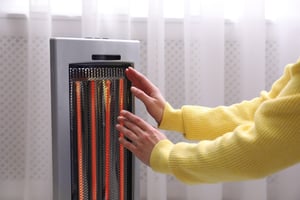
It’s September, and soon the weather will start shifting toward cooler fall weather – the first sign that winter will be here before we know it.
During the winter, you’ll flip from the AC that kept your home cool in the summer to using your furnace to keep your family warm. However, with this shift can come additional hazards, particularly when it comes to fire safety.
The threat of house fires from heating elements in the winter is very real. According to the National Fire Protection Association (NFPA), heating equipment caused one in seven home fires that took place in 2014-2018 and accounted for 19% of home fire deaths.
Fortunately, there are some things you can do to protect your people and your property. Below, learn about the top causes of heating-related home fires and what you can do to prevent them.
Maintenance & Cleaning Issues
As a homeowner, it can feel like the list of maintenance items is never-ending when it comes to taking proper care of your home. But one you don’t want to skip is an annual inspection of your HVAC system.
During an inspection, a trained professional will look at your heating and cooling units inside and outside the home to ensure that everything is working properly and nothing needs replaced. Not only will this keep you safe – it also can help save on heating and cooling costs, since your system will be working as efficiently as possible.
You’ll also want to make sure to routinely replace filters throughout your HVAC system. Clogged or dirty filters can quickly fuel fires. Check your manual to see how frequently filters need to be changed, and don’t forget to also clean your air ducts. Air ducts should be cleaned every 3 to 5 years.
One aspect not to overlook when cleaning? Your fireplace. According to the NFPA, the leading factor contributing to home heating fires was failure to adequately clean out various elements – especially chimneys. Chimneys should be cleaned once a year.
Improper Spacing of Heating Elements
If your home gets especially cold in the winter, you might consider using a space heater. Space heaters are a good option to heat up a small room or especially drafty area, but special precautions must be taken – 81% of home heating fire deaths are caused by space heaters.
Precautions include:
-
Keep all space heaters on the floor - don't elevate them.
-
Keep it away from water.
-
Follow the three-foot rule - keep anything flammable at least three feet away in all directions from a space heater. This could include curtains, papers, clothing, furniture, and more.
-
Keep children at least three feet away from a space heater at all times.
-
Plug a space heater into the wall, not an extension cord or power strip.
-
Never leave a space heater unattended.
Keep in mind: the three-foot rule also applies to other heating elements, such as a furnace or fireplace. And, be sure to keep children far away from these items, too.
Gas Leaks
Gas leaks are often the more dramatic cause of home fires, as they can lead to explosions. It’s a scary idea, but gas leaks are typically easy to spot – or rather, smell.
Natural gas is infused with a smell similar to rotten eggs. If you smell rotten eggs for no reason, immediately evacuate your house and call 911, the fire department or your utility company’s emergency line if they have one. Don’t turn on any electrical switches or do anything that might make a spark. Don’t use your phone or open your garage door. Just get out and call for help immediately.
You should also alert your neighbors so they can evacuate as well. Be sure to stay far away until professionals give you the all-clear that it’s safe to re-enter the area.
Other Prevention Tips
No one wants to think about a fire happening in their home, but the best thing you can do is be prepared. One of the most crucial elements to staying safe during a fire is knowing that it’s happening, by having working fire alarms or smoke detectors.
Smoke alarms should be installed in each bedroom or sleeping area, and on every floor of the home. Ideally, you’ll have interconnected smoke alarms, so that if one goes off – they all go off. Smoke alarms should be replaced when they are 10 years old and tested monthly if possible.
Additionally, make sure your family has a fire escape plan. All family members should know two ways out of each room in the house, and they should know where to meet-up if they have to evacuate due to a fire or other emergency. If your family has small children or anyone who may not be able to escape on their own, make sure someone is assigned to assist them in case of emergency.
Home fires are a scary thought but being prepared can help ease the anxiety.
